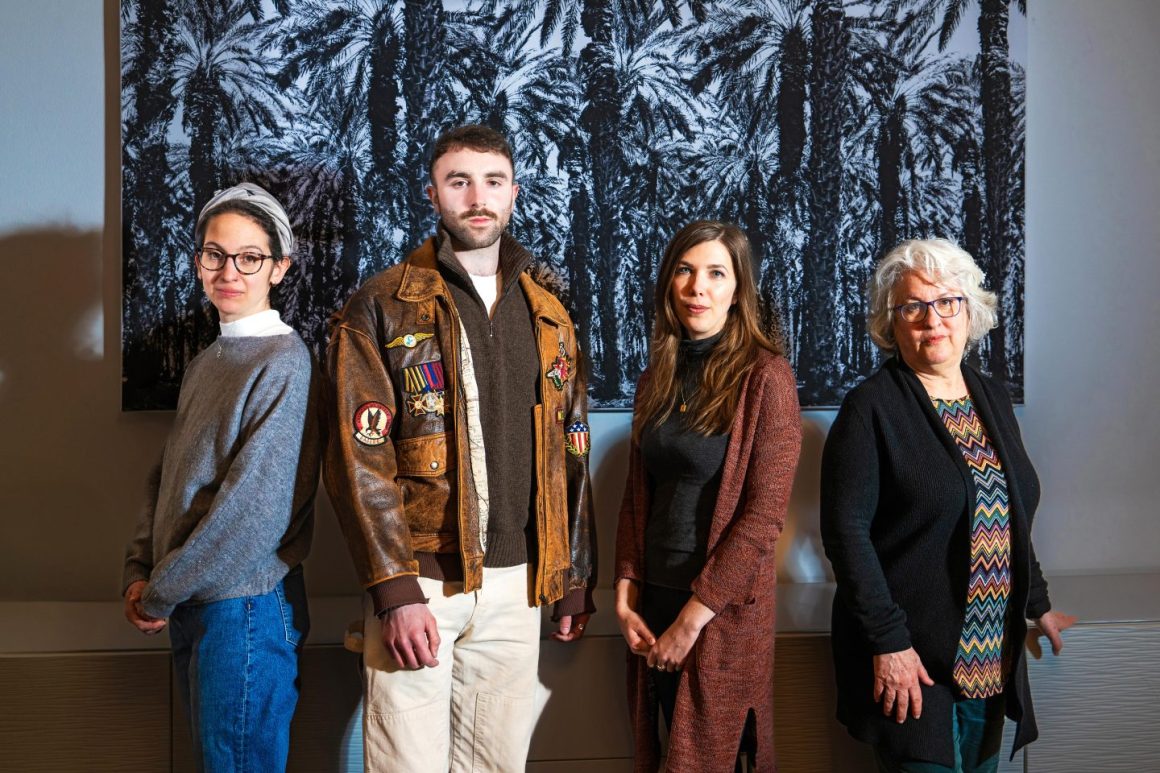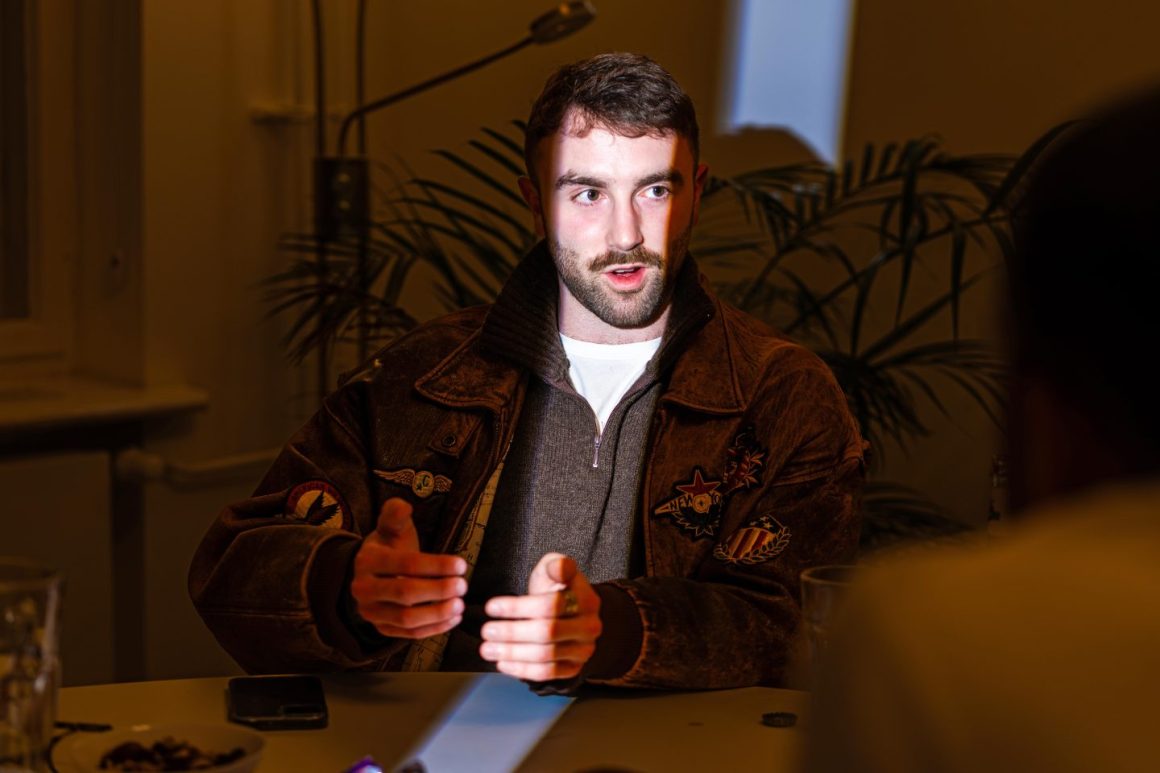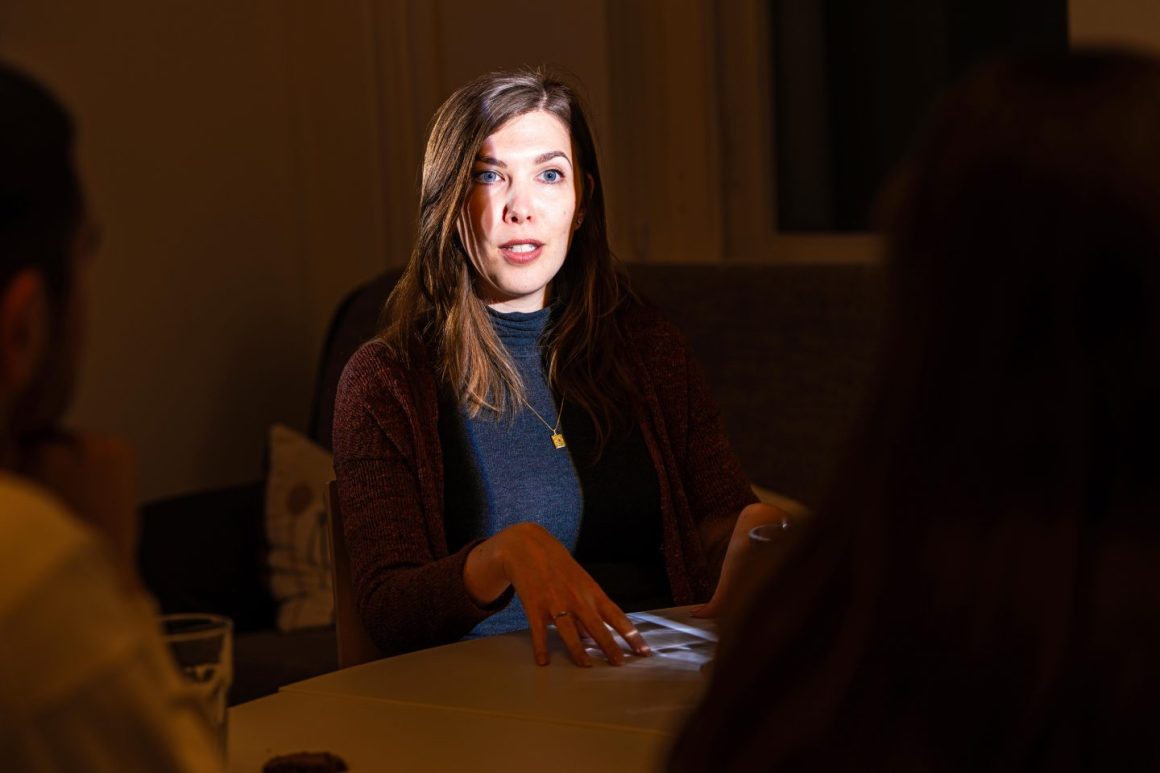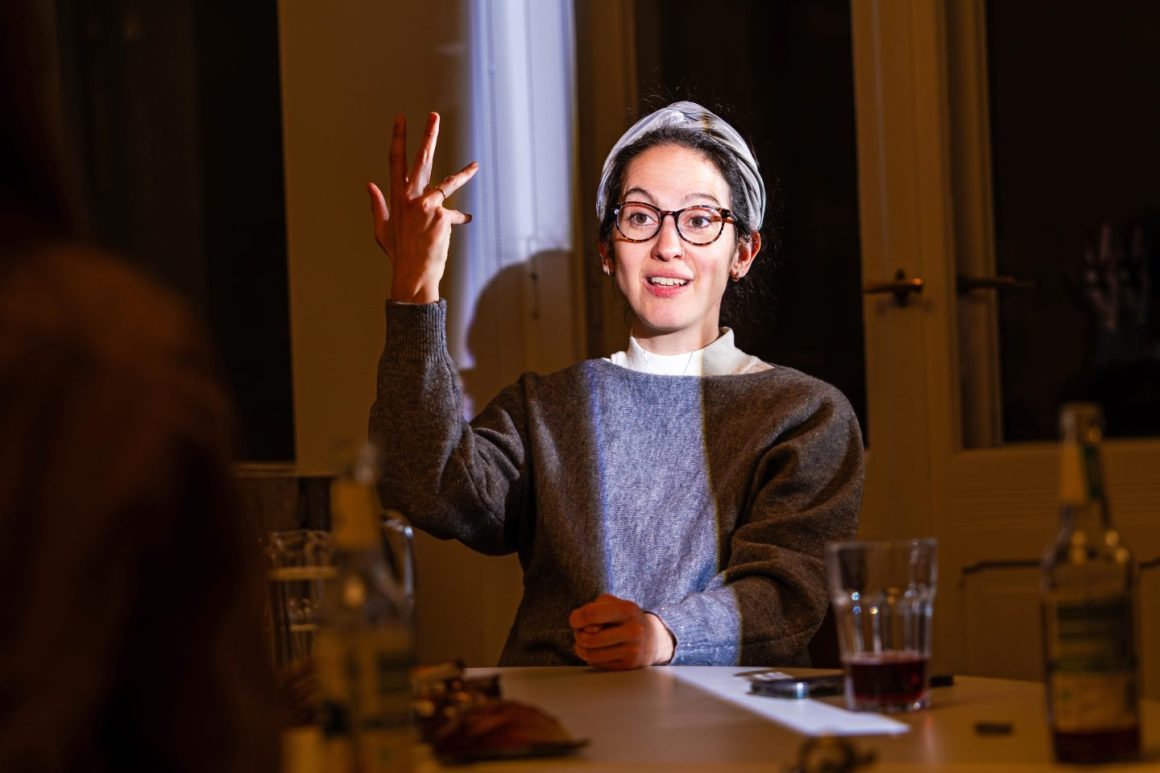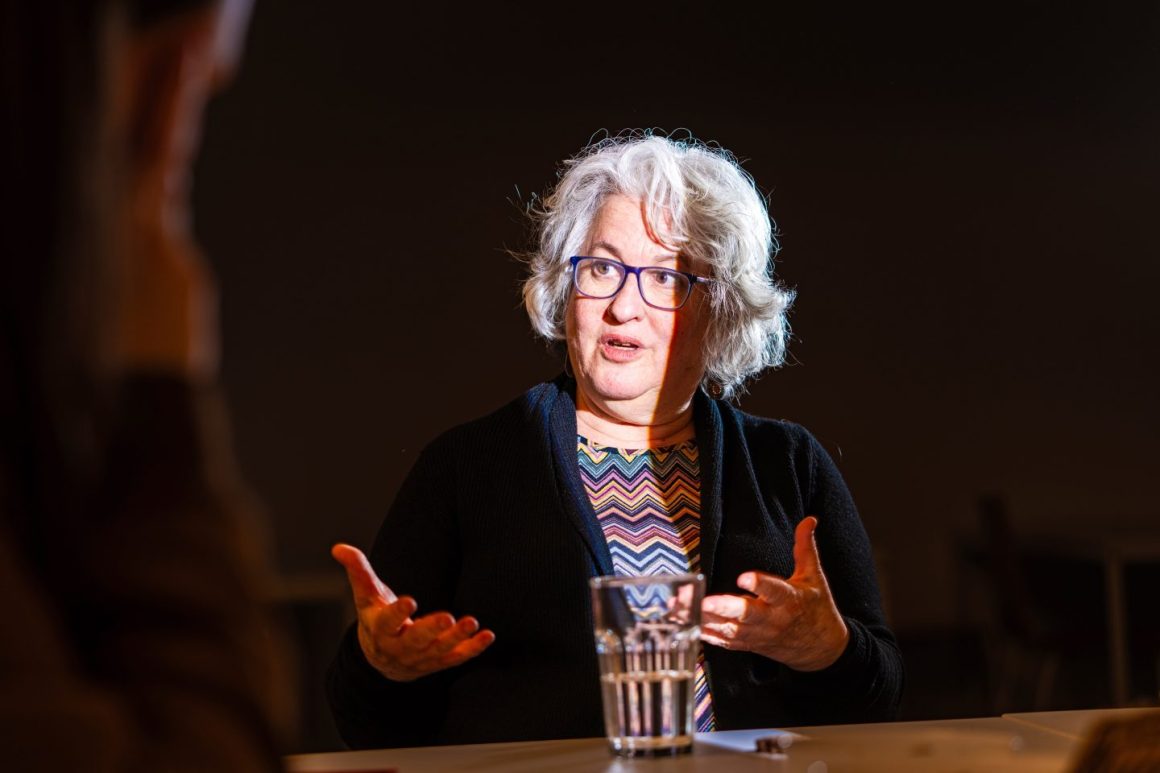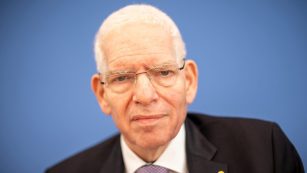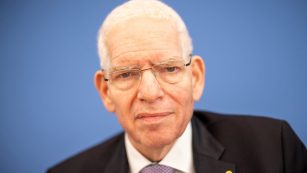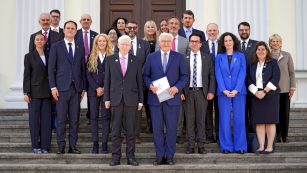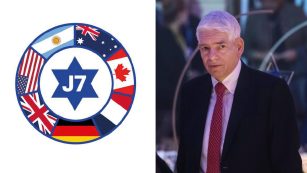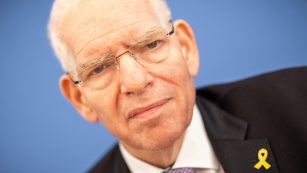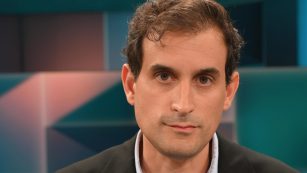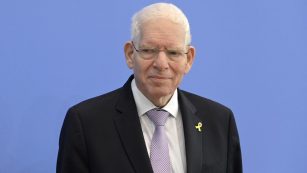What did you associate with Germany before you came here?
Rebecca: The final solution…
Toby: Absolutely. I was born in 1956, so I grew up in a period when the Holocaust was a major topic, for example in our synagogue.
Rebecca: In my family, we boycotted Germany: no shoes, no cars …
Liora: The same was true in my family.
Dylan: For me, Germany was a country that was cleansed of Jews, a country that no longer existed within the context of the Jewish world. I had no idea that there was still an active Jewish community here.
Toby, you came to Germany in 1997 on a Fulbright scholarship, working as a journalist. What drew you here?
Toby: I was working as a journalist before and got interested in how non-Jews in Germany coped with the Holocaust in their own families or their own towns. I wanted to find out how people live with this past. And at the time, of course, there were many more people around who were still perpetrators or witnesses.
How would you describe Berlin’s Jewish community when you moved here in the late 90s, compared to where you grew up?
Toby: In Long Island and also in New York City, I was part of a huge Jewish community. And coming here, I still had that mindset. I remember going to my first synagogue service on a holiday, and I was looking around to discover the streams of Jews walking to synagogue, which I would be used to seeing. And I saw all these people walking, and then they peeled off and went to this market. They were all just shopping for veggies. There was only one guy who walked into the synagogue before me. So that was a bit of a culture shock. But I also still remember being in the synagogue and a child was running around and then tripped over a wire and pulled out the lights. The entire sanctuary went dark and everyone laughed. And so I thought, okay, here is Jewish life.
How did you feel about entering the community as an American?
Toby: I was really cautious about getting involved because I did not want to barge in, be the ugly American. I was not that kind of person. I was the journalist watching from the outside, writing about stuff.
What do you mean by an ugly American?
Toby: It’s an old stereotype, that’s sometimes true. I remember once during a meeting with members of the Jewish community, an American jewish visitor asked: Why do you still live here? How do you feel about bringing up your children in Germany? One woman broke into tears. She was so offended and hurt. There was definitely tension with the Americans who thought they knew everything, wanted to help, but were often too intrusive.
»When I came to Germany in 2013, there was this big boom of Jewish grassroots organizations.«
Liora jaffe
Liora, you came here more than 15 years later. Was your experience different from Toby’s?
Liora: I came in 2013, a really interesting time. The younger generation of post-soviet Jews who mostly grew up here wanted to fill in this void that Toby described. There was this big boom of Jewish grassroots organizations. There was a sense that you could do anything. You could shape the community.
What role did American Jews play in this boom?
Liora: A complicated one. There were a few American institutions that invested, and there were certainly American interests in maintaining a Jewish community in Europe and in Germany in particular. But in the end, a lot of the successful projects were homegrown here.
Rebecca: I totally agree. I remember a lot of Americans who were here and brought energy and knowledge. It was a helpful little push, but no way could it have been sustained. In the end it was all the people who grew up here.
Rebecca, you and your husband came in 2016 and founded a community for young Jews. Why did you leave the biggest Jewish city in the world, New York, and moved to Berlin as a rabbi?
Rebecca: It was a very personal choice. We feel much more comfortable in smaller Jewish communities. In Brooklyn, we had everything at our fingertips. We had kosher stores and restaurants, Judaica and modest clothing shops at every corner. But we believe that part of living a meaningful Jewish life is to live it consciously. And we had started to lose our sense of intention. As rabbis, we really want to get to know the people who are around us. We came here actually feeling somehow like we had more in common with the Jews in Berlin rather than those in New York.
And did this feeling turn out to be true?
Rebecca: Not exactly. I learned how much knowledge I have taken for granted just by growing up in a house where both my parents were Jewish and practicing something. I saw how my mother made Shabbat. I saw how my father prayed. Living in a house where people did something that they got from their parents, from their grandparents didn’t exist here. I knew intellectually that Jews in Germany cannot carry a mimetic tradition, and that everything that is happening here has to be learned because of the huge rupture that was caused. But I had to go through a process of really understanding what that meant.
»In Berlin, you have a little bit of the diversity that you have in New York, but with less barriers.«
dylan kassin
Dylan, you came to Germany last year. Hearing these stories about the utopian, blooming times in the early 2010th – is there still the same attractiveness for American Jews to move here?
Dylan: Berlin is still famous for all the fun stuff young Americans dream about: parties, techno and so on. It’s not the amazing Jewish community that draws them here. That being said, when I went for my first Shabbos to an orthodox synagogue in Berlin and saw a lot of people of all ages, kids running around, teens in jeans who might be using their phone after service, a guy with a full streimel – I was amazed. Here, you have a little bit of the diversity that you have in New York, but with less barriers. You have the beautiful opportunity to access and discover more for yourself.
Liora: When I first came here, I had a very different experience, especially in the traditional communities, mostly outside of Berlin. I definitely ended up more than once at a Kiddusch where I was the only English speaker. The communication was reduced to: «shot of Vodka?”
Rebecca: Yes, I also wondered: When you say the community is so accessible, Dylan, how would you define that?
Dylan: Information for things that are going on is widely available and published. And as long as you can get on the list so that security guy lets you in, then you’re in. I’ve had a pretty simple time interacting with people, even without speaking German or Russian. I felt no tension inside the Jewish community.
Toby: I think there’s a huge difference between when I came here and your experience, Dylan. I remember when I was looking for my spiritual home in Berlin, I wanted to go to an egalitarian service. And then I saw how some members of the community clashed over the question if there should be musical instruments at services. In New York, you could have just found a different synagogue. But in Berlin, the options were just not there.
Dylan: But there is also a very positive side to this. Because in New York everything is so split up, I felt like I couldn’t be just Jewish. You are like a Jew that goes to the shul on 13th Avenue, a modern-Orthodox Jew and so on. It’s not sufficient enough to be just a Jew, because there are so many.
Are Jews in Germany experiencing a different feeling of minority than Jews in America?
Liora: In the U.S., I never felt like a minority. Only here I understood really what it feels like to be a really small part of a bigger society.
Rebecca: This feeling of being a minority in Germany also crystallized since October 2023. I understood in a whole new way how important Israel is as a sanctuary for Jewish people, especially some of the young people I work with whose families came here from the Former Soviet Union, who have literally felt the fact of a safety net ripped out from under their feet themselves. When I lived in the US, at least in communities I was part of, it felt like the safety net of our life in America was more intact. It helped create some distance from that feeling of needing a sanctuary at all. But living here in Germany, the need for a sanctuary – and the crucial role of Israel for so many Jews – feels much closer.
There seems to be a clash between left-wing Jewish intellectuals from the U.S. and Germany’s approach to antisemitism and anti-Zionism. The American-Jewish philosopher Susan Neiman speaks of a »philosemitic McCarthyism« in Germany in the wake of October 7th.
Rebecca: There is a disconnect between American Jewish left-wing circles and the Jewish community in Germany. In Germany, Jews are a small minority, often disconnected from their cultural and religious roots, and growing up Jewish is more challenging. Many American Jews don’t fully understand this. Additionally, the concept of free speech in Germany differs significantly from the U.S., where it is much more expansive. American Jewish critiques of Germany miss this important distinction.
»I find it misleading when people claim that one is not allowed to criticize Israel in Germany.«
toby axelrod
Toby: In Germany, there are specific things one is not permitted to say, display, do, or even sing. There is certainly a strong reaction here when people cross that line. At the same time, I find it misleading when people claim that one is not allowed to criticize Israel in Germany—because that is simply not true. I see such criticism regularly.
Rebecca: I think it‹s very important to mention this point because that accusation is not only misleading but also does a great disservice. The discussion is so polarized, with only two apparent extremes: left-wing intellectualism on one side and philosemitic McCarthyism on the other. In this climate, the Jewish community is placed in a no-win situation.
Dylan: I still feel some restrictions on free speech go too far. Sometimes, it feels like people take offense simply at the idea that others are even expressing an opinion that they oppose.
Toby: I used to feel the same way. But after spending time here, I’ve come to see things a bit differently. At certain demonstrations, some people chant «From the river to the sea, Palestine will be free,” which, to many people, carries an eliminationist message. Personally, that’s where I draw the line. There is no point in dialogue if my conversation partner says they oppose the existence of the jewish state.
Dylan: I don’t know, it just gives me a strange feeling when people who aren’t Jewish in the German government create laws for protecting Jews, that at the same time make certain Jews coming to Germany feel uncomfortable. Obviously, that’s a very superficial perspective and doesn’t really address the issue itself. But sometimes, I think it’s important to take a step back and acknowledge that, in a way, all of this feels quite ridiculous.
Liora: I relate to Rebecca’s point about polarization—it feels like you can’t win when the sides aren’t communicating. Sometimes, it feels hopeless.
Toby: Everyone wants to win the argument rather than listen to what the others have to say.
The special relationship between Germany and Israel is also shaped by the Holocaust. How do you feel about the way Germany has reckoned with this chapter of its history?
Toby: Everyone with German roots has confronted this issue—either rejecting it, embracing it, or acknowledging it without engaging further. But no one can fully dismiss it. The whole concept of the »Schlussstrich«—the idea that there’s a point where we should call an end to this discussion as if we’ve already dealt with it—seems to me so inadequate, so superficial, so shallow.
Liora: What stands out to me is the level of discomfort many people have with Jews. There has been a focus on reckoning with the history of murdered Jews, with many texts written on that topic. However, I think people here are still unsure of how to engage with those of us who are alive and well. It’s not necessarily that people are overtly anti-Semitic. It’s more about the discomfort that arises when I say, I’m Jewish, and this glitch moment where you can see people processing it, unable to react to you the same way they did before or suddenly start telling you horrible stories about what their grandparents did. Sometimes, it feels as though people can only relate to you through the topic of the Holocaust.
Rebbeca: There’s a disturbing amount of fetishization of Jews. That is not something I have experienced in the U.S.. And when I tell American colleagues and friends about it, they find it bizarre.
Toby: Being objectified and turned into a symbol of Jewish identity is something I experienced early on.
Dylan: I definitely experienced that as well. A lot of the behavior I encountered in Germany felt like a strange manifestation of guilt, in a way.
Many people in Germany seek what Toby referred to as a »Schlussstrich« and with the »AfD« there is a party that advocates precisely for that. Interestingly, they are now receiving support from the U.S. Elon Musk spoke at one of their rallies, stating that there was »too much of a focus on past guilt.«
Toby: What is happening in America now feels like a betrayal of the American values and principles I grew up with, such as liberty and free speech. If the President of the United States or Musk, who seems to hold influence akin to that of the president, makes a statement that affects Germany, it is both sad and frightening to me. However, I believe Germany is strong enough to resist such influences. At least, I hope so.
Rebecca: I grew up in an Orthodox community, and there are many people who believe that the current president and his associates are doing the right thing. They trust them when they deliver speeches and visit Germany. They have never heard of the AfD before, but now they have, and I have relatives telling me, »Oh, I heard the AfD won 20%. That sounds great.« But I believe this party carries a very dangerous legacy. Looking at America from here, I feel very confused about what happens there, about what it means to see vital infrastructure and entire departments, which have been essential for decades, being cut or reduced.
»We need to take the issue of the lack of knowledge about Judaism in the Jewish community in Germany more seriously.«
rebecca blady
Liora: I work in the humanitarian sector, and there have been devastating cuts to U.S. AID. Abandoning impoverished countries and people contradicts my Jewish values, and perhaps even my American values. With the U.S. significantly stepping back in this area, Germany has become the largest provider of aid in the world. I’m not generally an optimist, but maybe instead of fearing that the AfD will grow stronger in Germany, we can hope that Germany will serve as a beacon of democracy and humanitarian values in the future.
Could Germany also emerge in this situation as a beacon for Jewish life and a center of support for American Jews?
Liora: Maybe. At a recent Shabbat dinner, I met three American Jews who had all moved here since November. Perhaps it really is a trend.
Rebecca: Germany has a lot to offer. I think the institutional support for the Jewish community in this country is so explicit. God willing, it should continue. But we need to take the issue of the lack of knowledge about Judaism in the Jewish community in Germany more seriously. We need a stronger connection to Jewish ritual, spirituality, and identity. Without that foundation, there won’t be the confidence needed to sustain Jewish life for future generations and Jewish life in Germany may never truly flourish to a level even close to what exists in the United States. That being said, people in the Jewish community in Germany do a tremendous job and I hope they can take it to the next level. But it’s very hard work.
Dylan: I know the Orthodox Jewish world best, and at least for that community, it’s hard to envision a great future in Germany. In New York, kosher restaurants are everywhere, and you can find an Orthodox shul within walking distance. That’s simply not the case in Germany, not even in Berlin.
Liora: I don’t think all Jews are suddenly going to move to Germany. I think it’s more about practicality—what makes sense for people in their personal lives and the realities on the ground in different countries. If Germany is the place where the Jewish community feels safest, then Jews will come here. If they feel safer in America, they’ll stay there. It doesn’t have to be such an existential question.
Dylan: What about a sense of belonging, though?
Liora: I think Jews can belong anywhere. We have our own community. We happen to be American, but I feel at home in any Jewish space. I don’t need to be in a specific cultural context beyond that. For me, that sense of belonging is what makes me feel safe and happy.

